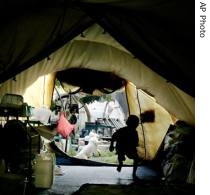2007年VOA标准英语-Thousands of Refugees Pin Hopes on East Timor's(在线收听)
Dili, East Timor
07 April 2007
Nearly 40,000 people are living in makeshift refugee camps in East Timor, afraid to return home because of violence that has kept this tiny country on edge for most of the past year. As VOA's Nancy-Amelia Collins reports from the capital, Dili, many refugees are hoping that Monday's presidential elections, and parliamentary elections that will follow in a few months, will restore stability, and allow them to resume their normal lives.

An East Timorese boy plays with a dog at a refugee camp on the grounds of a church in Dili, 07 Apr 2007
Just across from Dili's airport lies a makeshift refugee camp housing around 400 people. This is a common sight here: scores of camps like this one are spread around East Timor's capital.
The residents of the camps live in dismal conditions. The tents are hot, they flood when it rains, and rats and other vermin are a constant nuisance. The people survive on aid from the United Nations, and on whatever tiny amounts they can earn from small businesses some of them have set up.
Still, the refugees prefer to put up with conditions like these, rather than return to homes they do not consider safe.
Telvina da Costa lives with her children and extended family in the camp across from the airport. She is a strong woman, proud to have survived 24 years of harsh Indonesian rule after the territory separated from Portugal in 1975, and the violence that subsequently surrounded East Timor's vote for independence from Indonesia in 1999.
But Telvina is angry. Her home was destroyed a year ago when violence engulfed Dili after the firing of 600 soldiers led to wide-spread rioting. She and her family were forced to flee to this camp.
She says she wants to be able to live freely in her own country. She says that is why she voted for independence. She wants jobs so her family can live decently, and she wants a good education for her children.
There has been sporadic violence in the camps, some of it the result of people living in close quarters, some of it regional: people from one part of the country fighting with those from another.
Still, the camps are situated near areas patrolled by an international security force led by Australia. The residents consider the camps safer than the capital city.
Like so many others here, Telvina is hoping Monday's presidential elections will run smoothly, and bring the stability needed to allow them to return home.
All of the presidential candidates have said that resettling the refugees is a top priority. However, people like Lionel da Cruz, who lost his home during last year's riots and has lived in a camp with his wife for the last year, doesn't believe them.
Da Cruz says he fears violence will erupt again between the political parties no matter who wins the election, and this will keep him in the camp for some time to come.
"According to this situation, I'm still worried, because what I'm thinking, maybe it's getting to be a problem again, because if some of the bigger parties lose in this election, they will fight each other, and after that they talk about [democratization], but the problem is already done," said Da Cruz.
Eight candidates are running for the largely ceremonial post of president. Unless one wins more than 50 percent of the vote, a run-off between the top two contenders will take place in 30 days.